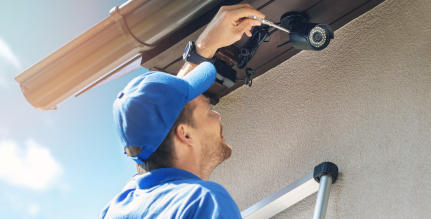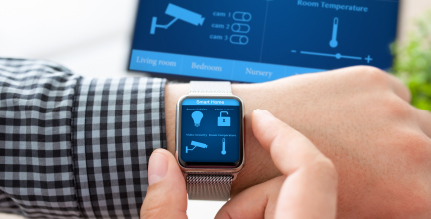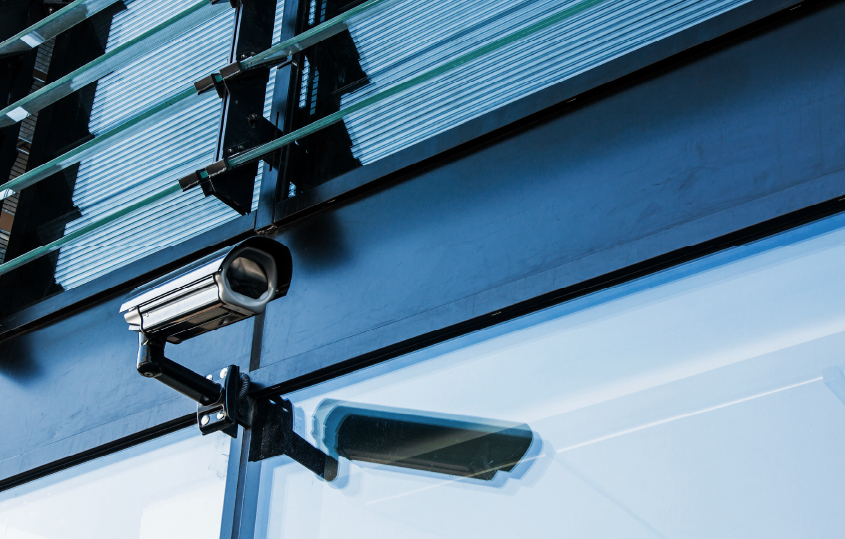Giving you peace of mind and protection, security cameras are a necessity when it comes to your home. But can they be useful in an area where WiFi isn’t available? The short answer is: yes, they can be useful. However, outdoor security cameras without WiFi can frequently be limited. Understanding the different types of security cameras and the pros and cons of each is the best way to decide which security camera can be a perfect fit for your home—even if it does not include WiFi.

Types of Cameras That Do Not Need WiFi
Before we get into the advantages and disadvantages of outdoor security cameras without WiFi, it’s useful to know exactly which ones they are:
-
Closed-Circuit Television Cameras (CCTV)
CCTV cameras are more often than not used by businesses and police departments for surveillance purposes. While they aren’t generally used for home security purposes, CCTV cameras display footage on several monitors and store footage on a DVR or a network video recorder (NVR).
-
HD-over-coax
With HD-over-coax cameras, uncompressed video transmits from cameras to recorders via coaxial cable. While videos are transmitted in high resolution, very few cameras are can with coaxial cables.
-
Analog
Analog cameras can also transmit video from the camera to a DVR via coaxial cable.
-
IP
IP cameras are synonymous with surveillance cameras for the most part and more expensive than traditional home security systems.
No Internet Connection? No Problem
If you live out in a rural area or have an unreliable Internet connection, chances are you may not have a strong connection to the Internet, but that’s no reason to worry. All you need to do is obtain a hardwired security camera system which includes a network video recorder (NVR) and several WiFi surveillance cameras. Such camera surveillance systems enable 24/7 surveillance and video recording without access to the Internet. NVR and the cameras will connect automatically on their proprietary network to communicate with each other without connecting to the router. Once you connect the NVR to a monitor or an HD TV, you can begin your 24/7 surveillance.

Advantages of Wireless Cameras
-
Not As Hackable
Because hardwired camera systems may require cellular data, they are not as hackable as they would be if they required WiFi networks. Wireless networks are at higher risk to hacking and less secure than wired networks which may only be accessible from one physical location. Systems that do not use WiFi also avoid service disruptions that are common with wireless networks.
-
May Still Have Access to Remote Features
Depending on whether you use a cellular data plan, your hardwired security camera system may still have access to remote control, notifications, and live streaming.
-
No Faulty WiFi
Probably one of the bigger advantages of having a hardwired security camera system is that you do not have to worry about WiFi that isn’t dependable. Depending solely on WiFi can mean losing connection from time to time if the strength of your network is low.
Disadvantages of Wireless Cameras
Although options for surveillance cameras without WiFi are available, they are limited. The biggest disadvantage of using a camera without WiFi is that the footage may not be compatible with a smartphone app; however, that does not mean the footage cannot be accessed at all. Some other disadvantages include the following:
-
Difficult to Install
A security camera that is not using WiFi requires more work than one that is. Whether you’re installing the camera outdoors or indoors, it’s wise to consider where exactly you want the camera placed and how accessible it is to route the cables from the recorder to that specific location. Depending on where you install the camera, you may need to use some tools—such as drills and ladders—to set them up.
-
No Access to Live Footage
Although you can access live footage while you are in your home, that is not the case when you are someplace else. This is a critical downside as it limits the ability to take action—like calling the police for help or scaring off unwanted guests—that can prevent further damage from happening while you are away from your home. Hardwired security cameras, unfortunately, only give you the option to review footage later.
-
Wires Throughout Your Home
A hardwired security camera means having an abundance of wires throughout your home. One positive that comes from this is that you can neatly arrange your wires with cable organizers; however, this option can be limited depending on where you need to run a wire to connect to the other part of your home security system. For example, if your DVR/NVR box is located downstairs but your camera is located upstairs, you will have to hook the camera’s cables across your home.
-
They Are Bulky
Many CCTV cameras that require large DVRs tend to be bulky, which can cause an inconvenience in some instances.
-
They Are More Expensive
Because they are typically made for police or business use, CCTV cameras typically cost more than the average security cameras that work with WiFi.
Install Your Security Camera System with Mesa Alarm Systems!
While there are both pros and cons to installing a hardwired security system, it ultimately depends on you to decide which security system option is best suited for your home. In some instances, cameras without WiFi may be a more realistic option. Regardless of which option you choose, Mesa Alarm Systems is here to help you! From cellular data plans for security systems to installation, we have everything you need to ensure top security for your home. Visit our website to learn more



